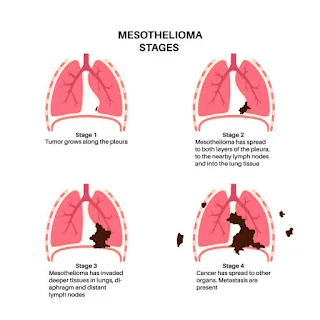Stage 3 Mesothelioma Cancer
Stage 3 Mesothelioma Cancer is an advanced stage
of a rare, but aggressive disease often caused by asbestos exposure. This article
reviews the clinical characteristics, symptoms, diagnosis, and treatment of
Stage 3 Mesothelioma Cancer.
What Is Stage 3 Mesothelioma Cancer?
Mesothelioma is a type of cancer that develops in
the lining that covers the outer surface of some of the body’s organs, which is
known as the mesothelium. In Stage 3 Mesothelioma Cancer, the tumor has spread
beyond the original site to nearby neck structures, to nearby lymph nodes, but
not to distant sites. It is locally advanced with no body spread and no spread
to distant areas of the body. IIIA), the size of the tumors and the affectation
of the adjacent structures increase their complexity for treatment.
Symptoms Associated with Stage 3 Mesothelioma
Cancer
As Stage 3 Mesothelioma Cancer advances, symptoms
are generally more pronounced and evident. Their symptoms include chest pain,
and some of them have chronic cough, fatigue or weight loss. If the cancer
metastasizes, the eventual signs include abdominal bloating or pain, nausea and
changing bowel habits. Tumor invasion into lung, lymphatic lowerability, and
organ functions condition these signs. Identification of these signs early
could lead to prompt medical evaluation.
How Is Stage 3 Mesothelioma Cancer Diagnosed?
Stage 3 Mesothelioma Cancer imaging (ie,
pathology, clinical) is based on imaging, pathology and clinical examination.
CT, MRI, and PET scans are important in determining the size and location of
the tumor, as well the extent to which it has spread (metastasized). A biopsy
is needed to verify the presence of mesothelioma cells and to establish the
cancer’s subtype — which may affect the type of treatment offered to the
patient. And what about the overall health and lung function of the patient: Do
these factors play a role in deciding how to treat them? Accurate diagnosis is
important to determine the complete Stage 3 Mesothelioma Cancer status and best
therapies.
Treatment Options for Stage 3 Mesothelioma
Cancer
) is generally a multi-disciplinary because disease
at this point can become very complicated. Depending on the location of the
tumor and the patient’s other medical conditions, surgery might still be an
option to remove some of the tumor that can be seen. Standard approaches
involve pleurectomy/decortication or extrapleural pneumonectomy for
mesothelioma involving the lung. But seldom does surgery alone suffice.
In some cases of surgical management adjuvant
chemoradiation is employed with the goal of eradicating remaining cancer cells
and reducing the tumor. Chemotherapy with drugs such as pemetrexed and cisplatin
or carboplatin has been shown to work for the facets of the cancer. Symptomatic
disease can be treated and disease progression limited with use of local
radiation. Novel treatments, including immunotherapy, are also providing hope
to Stage 3 Mesothelioma Cancer by boosting the immune system to fight cancer.
Prognosis and Survival Rates
The result of Stage 3 Mesothelioma Cancer depends
on a variety of factors, including the type of cancer, a person’s age, overall
health, and extent the cancer responds to treatment. While this represents
advanced-stage disease, overall survival is better with therapy than in
previous eras. Median survival is generally 12–21 months although a small
number of patients will survive longer with the best treatment and care. A
greater early detection and accessibility in specialist cancer centers lead to
the (survival) rate.
Living with Stage 3 Mesothelioma Cancer
Dealing with a Stage 3 Mesothelioma Cancer
diagnosis can be challenging physically, emotionally and practically. Symptom
control and palliation play a crucial role in improving the quality of life.
Pain relief, respiratory care and nutrition may all help to make the patient
comfortable. Psychologic support CBT (cognitive behavior therapy) is very
beneficial to the patients and their families to cope with the psychological
consequences of the disease. Communicating with Healthcare Providers You can
discuss how healthcare information can be used to customize care plans.
The Importance of Expert Care
Because of the complexity of treatment and care
for (prostate cancer), it is advisable that management be directed by
physicians experienced with this type of disease. Oncologists, thoracic
surgeons, radiologists, and palliatives teams need to co-ordinate their efforts
if there is to be any hope of effective therapy and symptom control. Patients can
also experiment with new options that aren’t widely available everywhere if
they can get into clinical trials. Doctors recommend that patients go to
mesothelioma specialist centers to get the most recent treatments.
Prevention and Awareness
How to prevent mesothelioma cancer avoiding the
risk of mesothelioma cancer mostly involves preventing exposure to asbestos,
the most common cause of mesothelioma. Understanding that exposure of asbestos
in the work place, and at home as well as other older buildings is necessary in
order to prevent future cases. Early detection, such as with the above cases,
and regular health checkups for individuals with a history of asbestos
exposure, or appropriate medical checkup and treatment of respiratory symptoms,
may contribute to the early diagnosis before progressing to an advanced stage
(12). The most popular public health interventions remain health campaigns to
inform the public and make the environment safer.
Conclusion
Stage 3 Mesothelioma Cancer is a reflection of
the course of the disease; there is extensive spread of the tumor, and a
greater burden of symptoms. However, despite these difficulties, the recent
advances in diagnosis and therapy for patients facing this diagnosis, are
starting to result in a more favorable prognosis. An early diagnosis, specialized
care and an individualized, multidisciplinary and integrated treatment approach
are essential. The longer the physical symptoms and emotional pain pile up, the
more support a patient needs as things creep forward. The patients having Stage
3 Mesothelioma Cancer can only make this perhaps miserable visit with more hope
and confidence if they are aware and seek expertized medical advice.
FAQs About Stage 3 Mesothelioma Cancer
Can Stage 3 Mesothelioma Cancer be cured?
Advanced stage While it is not possible to cure
Stage 3 Mesothelioma Cancer, it is possible to treat to keep you alive and well
longer. The best results are achieved with a combination of surgery,
chemotherapy, radiation, and new therapies.
We have a stage 3 mesothelioma life expectancy
below is it?
Survival is greatly variable, yet in general is
one to two years after diagnosis. Life expectancy is based on cancer type, treatment
options, and overall health.



.jpg)










0 Comments